
Organic farming, also known as ecological farming or biological farming, is an agricultural system that uses fertilizers of organic origin such as compost manure, green manure, and bone meal and places emphasis on techniques such as crop rotation and companion planting. It originated early in the 20th century in reaction to rapidly changing farming practices. Certified organic agriculture accounts for 70 million hectares globally, with over half of that total in Australia. Biological pest control, mixed cropping, and the fostering of insect predators are encouraged. Organic standards are designed to allow the use of naturally-occurring substances while prohibiting or strictly limiting synthetic substances. For instance, naturally-occurring pesticides such as pyrethrin are permitted, while synthetic fertilizers and pesticides are generally prohibited. Synthetic substances that are allowed include, for example, copper sulfate, elemental sulfur, and veterinary drugs. Genetically modified organisms, nanomaterials, human sewage sludge, plant growth regulators, hormones, and antibiotic use in livestock husbandry are prohibited. Organic farming advocates claim advantages in sustainability, openness, self-sufficiency, autonomy and independence, health, food security, and food safety.

Intensive agriculture, also known as intensive farming, conventional, or industrial agriculture, is a type of agriculture, both of crop plants and of animals, with higher levels of input and output per unit of agricultural land area. It is characterized by a low fallow ratio, higher use of inputs such as capital, labour, agrochemicals and water, and higher crop yields per unit land area.
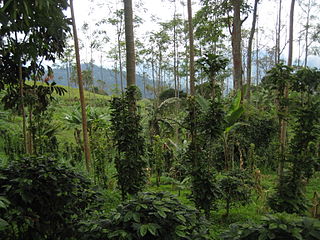
Sustainable agriculture is farming in sustainable ways meeting society's present food and textile needs, without compromising the ability for current or future generations to meet their needs. It can be based on an understanding of ecosystem services. There are many methods to increase the sustainability of agriculture. When developing agriculture within sustainable food systems, it is important to develop flexible business processes and farming practices. Agriculture has an enormous environmental footprint, playing a significant role in causing climate change, water scarcity, water pollution, land degradation, deforestation and other processes; it is simultaneously causing environmental changes and being impacted by these changes. Sustainable agriculture consists of environment friendly methods of farming that allow the production of crops or livestock without causing damage to human or natural systems. It involves preventing adverse effects on soil, water, biodiversity, and surrounding or downstream resources, as well as to those working or living on the farm or in neighboring areas. Elements of sustainable agriculture can include permaculture, agroforestry, mixed farming, multiple cropping, and crop rotation.
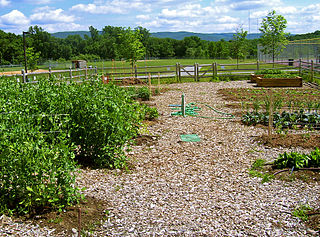
The following outline is provided as an overview of and topical guide to organic gardening and farming:

Community-supported agriculture or cropsharing is a system that connects producers and consumers within the food system closer by allowing the consumer to subscribe to the harvest of a certain farm or group of farms. It is an alternative socioeconomic model of agriculture and food distribution that allows the producer and consumer to share the risks of farming. The model is a subcategory of civic agriculture that has an overarching goal of strengthening a sense of community through local markets.
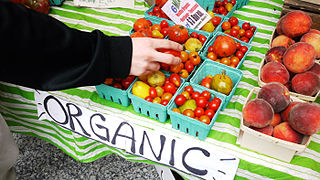
The organic movement broadly refers to the organizations and individuals involved worldwide in the promotion of organic food and other organic products. It started during the first half of the 20th century, when modern large-scale agricultural practices began to appear.

The Soil Association is a British registered charity focused on the effect of agriculture on the environment. It was established in 1946. Their activities include campaigning for local purchasing, public education on nutrition and certification of organic foods, and against intensive farming.
Biodynamic agriculture is a form of alternative agriculture based on pseudo-scientific and esoteric concepts initially developed in 1924 by Rudolf Steiner (1861–1925). It was the first of the organic farming movements. It treats soil fertility, plant growth, and livestock care as ecologically interrelated tasks, emphasizing spiritual and mystical perspectives.
Agribusiness is the industry, enterprises, and the field of study of value chains in agriculture and in the bio-economy, in which case it is also called bio-business or bio-enterprise. The primary goal of agribusiness is to maximize profit while satisfying the needs of consumers for products related to natural resources such as biotechnology, farms, food, forestry, fisheries, fuel, and fiber.

Organic horticulture is the science and art of growing fruits, vegetables, flowers, or ornamental plants by following the essential principles of organic agriculture in soil building and conservation, pest management, and heirloom variety preservation.
Integrated Farming (IF), integrated production or Integrated Farm Management is a whole farm management system which aims to deliver more sustainable agriculture. Integrated Farming combines modern tools and technologies with traditional practices according to a given site and situation, often employing many cultivation techniques in a small growing area.

The Biodynamic Federation Demeter International is the largest certification organization for biodynamic agriculture Its name is a reference to Demeter, the Greek goddess of grain and fertility. It is a non-profit umbrella organisation with 46 members organisations in 36 countries, and over participating 6,500 farmers around the world, representing both the global biodynamic movement and the Demeter certified biodynamic farms. The organization incorporates 19 certifying Demeter organizations, and the rest of the certification is done by the international certification committee.

Industrial agriculture is a form of modern farming that refers to the industrialized production of crops and animals and animal products like eggs or milk. The methods of industrial agriculture include innovation in agricultural machinery and farming methods, genetic technology, techniques for achieving economies of scale in production, the creation of new markets for consumption, the application of patent protection to genetic information, and global trade. These methods are widespread in developed nations and increasingly prevalent worldwide. Most of the meat, dairy, eggs, fruits and vegetables available in supermarkets are produced in this way.
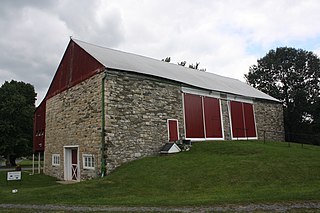
Rodale Institute is a non-profit organization that supports research into organic farming. It was founded in Emmaus, Pennsylvania in 1947 by J. I. Rodale, an organic living entrepreneur. After J.I. Rodale died in 1971, his son Robert Rodale purchased 333 acres and moved the farm to Kutztown, Pennsylvania.
The environmental impact of agriculture is the effect that different farming practices have on the ecosystems around them, and how those effects can be traced back to those practices. The environmental impact of agriculture varies widely based on practices employed by farmers and by the scale of practice. Farming communities that try to reduce environmental impacts through modifying their practices will adopt sustainable agriculture practices. The negative impact of agriculture is an old issue that remains a concern even as experts design innovative means to reduce destruction and enhance eco-efficiency. Though some pastoralism is environmentally positive, modern animal agriculture practices tend to be more environmentally destructive than agricultural practices focused on fruits, vegetables and other biomass. The emissions of ammonia from cattle waste continue to raise concerns over environmental pollution.
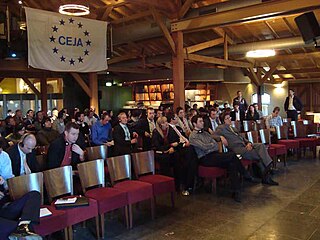
The Conseil Européen des Jeunes Agriculteurs (CEJA) is an umbrella organisation gathering young farmers from all over Europe and is one of the key advocates for the agricultural sector in Europe. This non-profit organisation currently has 33 member organisations from 22 EU member states and two observer members from non-EU countries, representing around two million young farmers. Its office is located in Brussels.
MIJARC Europe is the European continental branch of MIJARC. It is the platform or umbrella organization, representing the catholic, agricultural and rural youth movements in Europe. It has member movements and contact movements in Portugal (JARC), Spain, France (MRJC), Belgium (KLJ), Germany (KLJB), Hungary (KIM), Austria (KJÖ), Poland (EiR), Bulgaria (YMDRAB), Armenia (FYCA), Georgia (Umbrella), Italy, Malta, the Netherlands, Slovakia (ADEL) and Romania, representing around 150 000 rural young people aged from 12 to 35 years old. At world level, MIJARC represents more than two million young people from Asia, Africa, Latin America and Europe.
André Pochon is a Breton farmer born in 1931 in Saint-Mayeux. He retired in 1991. He is known to be one of the promoters of the farming and sustainable agriculture. In 2011, he was honored as a recipient of the Order of the Ermine for his contribution to Breton culture and development.
Bio Suisse is the main organisation of organic agriculture in Switzerland. This umbrella organization counts 33 organic farmers' associations among its members, as well as the Research Institute of Organic Agriculture FiBL. It notably manages the guidelines of the organic label "Bio Suisse".

Christiane Lambert is a French farmer and agricultural trade unionist who has headed the Fédération Nationale des Syndicats d'Exploitants Agricoles since 2017. In 2020, she became the president of the Comité des Organisations Professionnelles Agricoles - Comité Général de la Coopération Agricole de l'Union Européenne.











